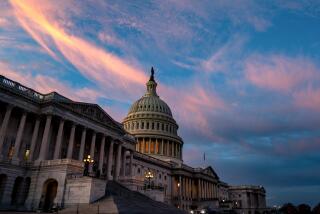Trading-Halt Rule Stumbles in Panel Vote
- Share via
NEW YORK — A Nasdaq stock market advisory panel has recommended against allowing Nasdaq to impose trading halts on volatile stocks, but the question nevertheless will go to the board of the stock market’s parent organization for a March 25 vote.
The issue has provoked an unusually intense debate in the Nasdaq community, with some opponents contending that a trading-halt rule would strike at the heart of Nasdaq’s uniqueness.
Officials at the rival New York Stock Exchange already are empowered to halt trading in securities when the stock specialists through whom all Big Board trades flow alert officials to extreme order imbalances or other unusual conditions. Even giant stocks such as IBM are sometimes subject to halts.
In Nasdaq’s auction-style market, by contrast, decentralized, relatively unfettered trading has always been a selling point and a point of pride.
But the explosion of online trading by home-computer users and professional day traders has produced unprecedented volatility, especially among smaller Nasdaq stocks. Some market participants want to give Nasdaq more tools to deal with the problem.
Frank Zarb, chairman of Nasdaq’s parent National Assn. of Securities Dealers, has called for a one-year test program under which trading could be temporarily halted when “significant corporate news”--which could include unfounded rumors--or extraordinary volatility are “impacting the fairness and orderliness of the market.”
Despite the rejection on a 9-4 vote Thursday evening by Nasdaq’s Quality of Markets Committee--on top of a previous “no” vote by an ad hoc panel--several people closely involved with the issue said they expect the NASD board to endorse Zarb’s proposal.
The Quality of Markets panel is composed mainly of securities-industry professionals, while the 35-member parent board has a broader membership that includes academics, public representatives such as former President Ford and representatives of public firms such as Microsoft Corp., Intel Corp. and Starbucks Coffee Co.
Bernard Madoff, president of Bernard Madoff Securities, one of the largest market makers in Nasdaq stocks, said the trading-halt rule is needed to give market makers an orderly way to handle sudden floods of orders that can occur when a stock is the subject of rumors in an Internet “chat room” or gets a mention on one of the financial-news TV channels.
Such events are becoming increasingly common. During the recent trading frenzy surrounding Internet stocks, obscure securities have traded at 100 times their normal daily volume with price spikes of 50% or more in a matter of hours or minutes.
With TV ads for online brokerages seeming to promise instant execution of orders, inexperienced investors have been shocked to find that their orders have gotten filled at much higher prices than they expected.
Brokerages such as Charles Schwab Corp. have moved aggressively to educate customers about the dangers of trading in fast-moving markets, suggesting that they use limit orders, which put a ceiling on how much a customer will have to pay for a stock.
Still, Madoff and other market professionals think that a trading-halt rule can provide an added safety margin. While a stock is halted, he said, market makers can “signal” what they think the new opening price will be, giving investors a chance to rethink whether they really want the stock at that price.
Some opponents of the trading-halt rule believe that it might increase volatility. For example, a trading halt might attract so-called momentum investors who would try to profit from a big price change when trading is reopened. Sophisticated traders might also try to “game” the system by trying to induce trading halts.
Others oppose trading halts on principle. Said one source familiar with the debate in the Quality of Markets Committee, opponents are “free traders to their core, and they don’t believe there should ever be a halt.”
A member of the panel who asked not to be identified said Thursday’s debate was spirited but “thoughtful,” adding that the question seemed to boil down to this: “Should the public be protected from itself and if so, how much?”
More to Read
Inside the business of entertainment
The Wide Shot brings you news, analysis and insights on everything from streaming wars to production — and what it all means for the future.
You may occasionally receive promotional content from the Los Angeles Times.










